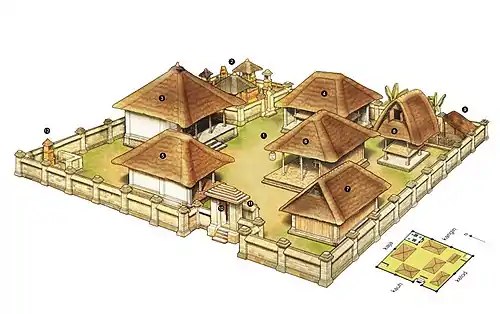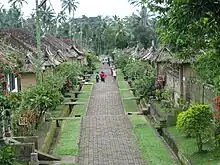Balinese traditional house
Balinese traditional house refers to the traditional vernacular house of Balinese people in Bali, Indonesia. The Balinese traditional house is the product of a blend of Hindu and Buddhist beliefs, fused with Austronesian animism, resulting in a house that is "in harmony" with the law of the cosmos of Balinese Hinduism.[1]

A bale meten (sleeping pavilion) within a Balinese house compound.
House compound
The Balinese traditional house is built as a house compound, where daily functions are separated not by rooms, but by individual structures within an enclosing wall.

A simplest type of Balinese house compound. Legend: 1. Natah 2. Sanggah Kemulan 3. Bale daja or meten 4. Bale dangin or sikepat 5. Bale dauh or tiang sanga 6. Bale delod or sekenam 7. Paon 8. Lumbung 9. a pigsty 10. Lawang 11. Aling-aling 12. Sanggah pengijeng karang

Several house shrines belonging to a Balinese house compound.

Distinctive shaped lumbung (rice barn) of southern Bali.

Gate houses marks the entrance to a private compound in this Balinese traditional village of Penglipuran.

A scene within a Balinese walled residential compound belonged to a common man.
See also
References
Citations
- Tjahjono 1998, pp. 36–7.
Works cited
- Auger, Timothy, ed. (2005). Eyewitness Travel Guides - Bali & Lombok. London: Dorling Kindersley Limited. ISBN 0751368709.
- Davison, Julian (2003). Introduction to Balinese Architecture. Singapore: Tuttle Publishing Limited. ISBN 9780794600716.
- Davison, Julian (August 5, 2014). Balinese Architecture. Singapore: Tuttle Publishing Limited. ISBN 9781462914227.
- Tjahjono, Gunawan, ed. (1998). Architecture. Indonesian Heritage. Vol. 6. Singapore: Archipelago Press. ISBN 981-3018-30-5.
- Nordholt, H.G.C. Schulte (2010). The Spell of Power: A History of Balinese Politics, 1650-1940. Verhandelingen van het Koninklijk Instituut voor Taal-, Land- en Volkenkunde. Leiden: BRILL. ISBN 9789004253759.
- Oka Saraswati, A.A. (2008). "TRANSFORMASI ARSITEKTUR BALE DAJA" [Bale daja architectural transformation]. DIMENSI - Journal of Architecture and Built Environment (in Indonesian). Surabaya: Institute of Research and Community Outreach Petra Christian University. 36 (1). Retrieved 29 October 2015.
External links
 Media related to Balinese traditional houses at Wikimedia Commons
Media related to Balinese traditional houses at Wikimedia Commons
This article is issued from Wikipedia. The text is licensed under Creative Commons - Attribution - Sharealike. Additional terms may apply for the media files.